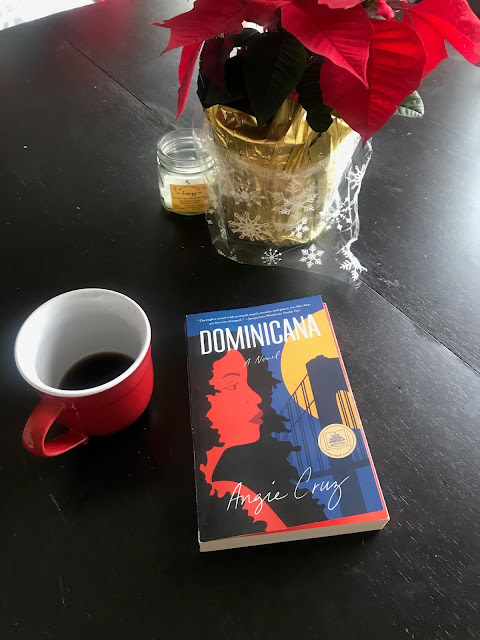Dominicana
by Angie Cruz
Flatiron Books, 2019
by Angie Cruz
Flatiron Books, 2019
Migration narratives have occupied a complex and intriguing place in Caribbean fiction since at least the 1950s. This is, perhaps, due to their dual nature—existing as both a staple of the genre while at the same time continuing to deliver some of the most vital, engaging and fresh stories being produced not only by the Caribbean community and its diaspora, but—as evidenced by the work of writers like Junot Diaz and Jamaica Kincaid—anyone currently engaged in the production of literature.
With her outstanding new novel, Dominicana, Angie Cruz propels herself into the first rank of chroniclers of the migration experience. Inspired by the story of her mother’s journey from the post-Trujillo Dominican Republic of the 1960s to the demographically-shifting New York City neighborhood of Washington Heights, Cruz brings us a compelling portrait of Ana, a newly-married fifteen year old girl who comes to the United States to live with the husband her mother has handpicked for her, thirty-two year old striver and philanderer Juan Ruiz. While it may not be shocking that Ana spends much of the novel in the circumscribed world of their small Upper Manhattan apartment attempting to negotiate the transition from being a small town girl awash in the dynamics of a large family—a girl who “had never seen La Capital” —to being a new immigrant in a city of millions with more than an abundance of alone time, what is amazing is the verve and dimensionality with which Cruz endows her narrator.
Part of what makes Domincana as compulsively readable as it is impacting is Cruz’s choice to render her narrative in 319 pages of very short chapters, with few if any more than four pages in length. While certainly not marketed as a novel in flash, one could easily make the case that her effective use of this “sudden fiction” technique is exactly what helps to make Cruz’s novel such a success. The short bursts of Ana’s life keep the novel’s momentum jumping forward expeditiously and allow Cruz the freedom to shift geography and perspective effortlessly as well occasionally gesture toward the experimental.
One of the most emotionally walloping sections of the novel involves Ana imagining herself in a sort of pastiche of I Love Lucy entitled Who Loves Ana? Opening with the zinger, “After he hits me, Juan brings home a TV and installs it in the living room,” the chapter works to decontextualize the routine sexism (not to mention racism) of the era through the “trick” of simply relating what happens on an episode of I Love Lucy as perceived by Ana. What Cruz offers us is a frightful mirror. We are reminded that we were, and still in large measure are, a society that faced with a scene in which a “wife hides behind her neighbors” in the face of an irate husband, what we are expected to find it is... funny.
Strained and complex family dynamics and the psychic costs of migration are turf Cruz covers well, never taking the easy way out and always making a point to dimensionalize her characters as they move through what is often a hostile environment replete with immigration agents and duplicitousness—occasionally from quarters the characters least expect. Ana’s struggles between serving as the family’s conduit to living in the United States as her mother demands and following her own dreams of a new, less encumbered life are consistently delivered in prose that makes us feel her inner conflict in a visceral way.
Like the best migration narratives, Dominicana strives to illuminate the realities of the place being left as well as the country of arrival—all the while never losing sight of humanity of the person making the journey. It represents a fine addition to both the canon of Caribbean literature as well as your bookshelf.
Damian Dressick is the author of the novel 40 Patchtown. His short fiction has appeared in more than fifty journals and anthologies, including W.W. Norton’s New Microfiction. He holds a PhD with a concentration in postcolonial literature from the Center for Writers at the University of Southern Mississippi. He co-hosts the reading series WCONA Live: Writing from Northern Appalachia. His next book, the short story collection Fables of the Deconstruction, drops in April of 2021. For more, check out www.damiandressick.com
Strained and complex family dynamics and the psychic costs of migration are turf Cruz covers well, never taking the easy way out and always making a point to dimensionalize her characters as they move through what is often a hostile environment replete with immigration agents and duplicitousness—occasionally from quarters the characters least expect. Ana’s struggles between serving as the family’s conduit to living in the United States as her mother demands and following her own dreams of a new, less encumbered life are consistently delivered in prose that makes us feel her inner conflict in a visceral way.
Like the best migration narratives, Dominicana strives to illuminate the realities of the place being left as well as the country of arrival—all the while never losing sight of humanity of the person making the journey. It represents a fine addition to both the canon of Caribbean literature as well as your bookshelf.
Damian Dressick is the author of the novel 40 Patchtown. His short fiction has appeared in more than fifty journals and anthologies, including W.W. Norton’s New Microfiction. He holds a PhD with a concentration in postcolonial literature from the Center for Writers at the University of Southern Mississippi. He co-hosts the reading series WCONA Live: Writing from Northern Appalachia. His next book, the short story collection Fables of the Deconstruction, drops in April of 2021. For more, check out www.damiandressick.com

Comments
Post a Comment